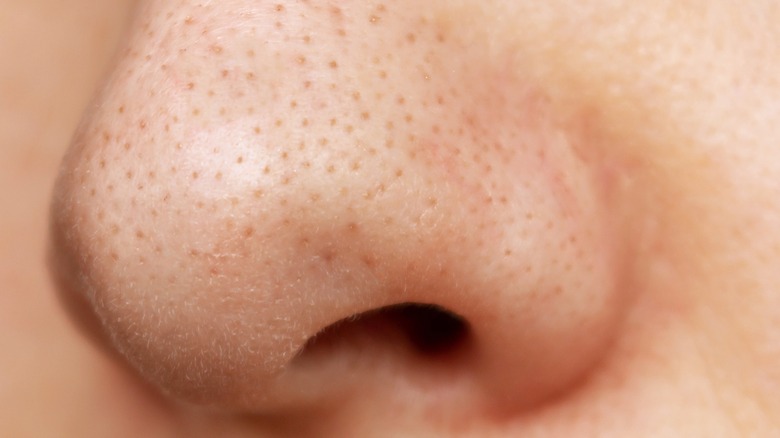The Side Effects Of Losing Your Sense Of Smell
Losing one's sense of smell can be a depressing and overwhelming experience. It can make you feel helpless and deprived of a source of pleasure, such as the comforting aromas of your favorite meals. Everyday activities (cooking and spending time outside, for instance) can become complicated and uncomfortable without the ability to detect smells. This impairment can cause isolation and frustration in a world where scent is heavily relied on for pleasure, enjoyment, and even protection.
A recent study published in Foods reports that 15% of the general population experience a reduced sense of smell, with approximately 2% losing their sense of smell. This statistic may seem insignificant, but it is impactful if it happens to you or someone you love.
While losing your sense of smell may seem insurmountable, there are still plenty of ways to find joy and adapt without relying too heavily on this particular sense. According to the Cleveland Clinic, most causes of anosmia (loss of sense of smell) can be resolved by treating the underlying cause. Therefore, most cases of anosmia are temporary.
Mental health implications with loss of smell
Many of us don't give much thought to our ability to smell. But what happens when that sense becomes suddenly impaired or even disappears? Loss of smell may be more than just a nuisance; it may also put us at risk for mental health issues such as increased isolation, anxiety, and depression. This is especially true in the elderly population. Those affected by this condition must understand the associated mental health risks to cope better (via OSF Healthcare).
Professional assistance may include mindfulness-based interventions or psychotherapy, which can provide strategies for dealing with stress caused by a loss of one's sense of smell. The goal of treatment is to maximize the quality of life by instilling coping mechanisms. Individuals should also reach out to their local community resources to find other support groups designed specifically for those affected by this condition (per Psychiatric Times).
Anosmia's impact on cooking and appetite
Anosmia can significantly affect a person's ability and desire to cook. Without the sense of smell, it isn't easy to discern the subtle nuances in flavor that make cooking so enjoyable. This often leads to a lack of comfort when preparing meals (via Foods). Additionally, food safety becomes an issue as the individual cannot detect signs of spoilage or contamination through scent alone. This can lead to health risks if they unknowingly consume food that has gone bad. To combat these issues, individuals with anosmia may need additional assistance when preparing meals, such as relying on visual cues or finding ways to enhance flavors without using aroma-based ingredients (per Monell Center).
The Mayo Clinic reports that anosmia can cause a loss of appetite regardless of whether the food was prepared by someone else or the individual with anosmia. Furthermore, poor nutrition and weight loss are possible in severe cases, as a lack of desire to cook and eat may progress if this condition is long-term.
Food texture can improve palatability without relying on smell
The sense of smell plays a vital role in taste perception. Exploratorium reports that smell is responsible for up to 90% of what we perceive as flavor. The aroma compounds in food give us clues about its taste before anything touches our tongue and can even cause saliva to start flowing.
According to the Institute of Food Technologists (IFT), texture manipulation maximizes palatability without using smell. Textures play a significant role in how food tastes both before it reaches our mouths and after we bite into it; from crunchy lettuce leaves to creamy mashed potatoes — each one adds its unique mouthfeel experience, which helps create memorable flavors even if no aroma is present. Different methods, such as frying or boiling vegetables before adding them to recipes, will enhance their taste and provide an enjoyable eating sensation that does not rely on smell. Epicurious explains that when we hear what we eat, the food tastes better, and our brain is stimulated to want more. In addition, the sensation in the mouth as different textured foods are consumed leads to a more enjoyable experience.
Losing your sense of smell can result in nutritional deficiencies
When dealing with the loss of smell, it is critical to know the potential risk factors for developing nutritional deficiencies. The symptoms of nutritional deficiencies can include fatigue, weakened immune system, hair loss, dry skin, achy bones or joints, lightheadedness, and weight changes (via RUSH).
Preventative measures for nutritional deficiencies can be taken to reduce the risk of further health complications. According to a study published in Nutrients, making healthy food choices, maintaining an adequate caloric intake, and avoiding processed foods are all examples of such measures. Individuals should also consume a balanced diet with sufficient levels of all essential nutrients, such as vitamins and minerals, which can be obtained from various sources, such as fruits, vegetables, and whole grains. Furthermore, those afflicted by anosmia may find it helpful to keep track of their dietary intake throughout the day to identify any potential nutritional gaps.
In cases where physical symptoms have worsened or medical intervention is required, supplementation with specific vitamins or minerals may be necessary to correct any deficiencies. Furthermore, assistance from healthcare professionals such as dietitians may help achieve better long-term results by providing tailored advice on lifestyle changes and developing meal plans that take individual needs and preferences into account (via Food and Nutrition).
The loss of smell could make life more dangerous
Many people underestimate the importance of smell, such as smelling smoke if food is burning or something is on fire — to discovering spoiled food and knowing how to avoid it. Furthermore, gas leaks may go undetected if your home has a gas leak, putting you in danger. According to a Fifth Sense study, 46% of people with a smell disorder had a gas scare in the last five years.
Other senses must be used to ensure safety if your sniffer is malfunctioning. Furthermore, it is critical to strengthen your home's security mechanisms. For example, check that smoke alarms and carbon dioxide detectors are installed and operational. Take extra time to ensure expiration dates are written on leftovers.
It may be necessary to rely on family or friends to help detect dangerous odors. Fortunately, most smell loss is temporary or a problem that may be resolved if the underlying cause is addressed. Therefore, it is essential to visit your healthcare provider to determine if there is a solution for your lost sense (via the Department of Public Safety).
Common causes of anosmia
There are numerous common causes of anosmia, or total inability to smell. The condition is most commonly caused by viral infections such as the common cold or influenza. Sinus infections, and more recently, COVID-19, can cause anosmia by inflaming the nasal passages and interfering with nerve signals sent from the nose's olfactory receptors (via Yale Medicine).
Other potential causes include head injury or trauma to the upper part of the face or head, polyps in your nasal cavity that block airflow and scent particles from entering the nose, diabetes, Parkinson's disease, aging-related decline in olfactory function (presbyosmia), and, tumors on your olfactory nerves or inside your nasal cavities that can block and even damage odor reception pathways.
Healthgrades mentions smoking can impair your sense of smell due to the pollution produced by inhaled smoke. This pollution alters the sense of smell for both the smoker and those nearby via secondhand smoke.
Lastly, WebMD reports that certain medications, such as antibiotics, heart medications, and antidepressants, can impair your ability to smell. You should consult your doctor to determine potential causes and treatments to help you get back on track.
Could an electric nose be the answer to long-term anosmia?
Electric (or bioelectronic) noses are a game-changing technology that has the potential to transform the lives of people enduring anosmia. It's fascinating to learn about the science behind how they work. The electric nose measures molecules in the air with sensors and then converts this data into a digital signal that can be used to provide feedback on what is being smelled. The process begins with a fan drawing in particles from the environment. These particles are sent through different sensors, each detecting specific characteristics such as chemicals within the air sample (via Nature).
The Journal of Biological Engineering also mentions how the sensor acts as a "nose," processing all of this data before converting it to a digital format that can be analyzed and interpreted. Electric noses have recognized many distinct smells using this method, including the ability to detect certain human diseases. Although the research is still in its early stages, it can provide hope for those who experience long-term loss of smell.
Smell training and natural remedies may help
The treatment for loss of smell is determined by what caused the failure in the first place. According to Healthline, smell training may be recommended and can be performed in the comfort of your home with products you may already have. All you need to do is smell a few strong odors for approximately 20 seconds per scent and repeat them at least three times daily. This is not a quick-fix solution and may take several months to complete.
Coffee, mint, vanilla, citrus, and clove are some suggestions from Healthline. Additionally, essential oils can be used. Essential oils are a well-known natural remedy for restoring smell. USA Today recommends several essential oils, including lemon, eucalyptus, lavender, and rosemary.
A study in Frontiers in Neurology reported that acupuncture is another potential natural remedy that has been found to help with loss of smell in some cases. It may work by stimulating nerve pathways in the nose while also helping to reduce stress levels, which may contribute to decreased olfactory ability. To experience long-term effects, the treatments must be administered over several sessions. However, patients report immediate improvement after a single treatment, but it is temporary, and it can take several months to see long-term effects.
How is anosmia medically treated?
The most effective way to treat anosmia and its complications is to be proactive in identifying any underlying conditions contributing to the disorder. Individuals affected by anosmia should seek professional help as soon as possible to receive a proper medical assessment and determine potential causes. According to NYU Langone Health, your doctor will obtain a health history and perform an exam to determine the cause. Imaging studies may be performed to look at the sinus cavities. Additionally, your doctor may use a lighted scope to visualize the nasal passages. Surgery may be suggested if your doctor notices any anatomical anomalies or blockages.
Some causes of odor loss cannot be treated, according to Fierce Biotech. However, they reported that Tufts University Medical School is researching olfactory stem cell growth. This study shows promise in "restoring a sense of smell" by regenerating nose tissue and sensory neurons with stem cells.
In conclusion, anosmia can be a troubling condition, but new treatments are continually being developed and studied that could bring hope to those experiencing loss of smell.
Tips for adapting to life without smell
It can be challenging to adjust to life without a sense of smell, but it is possible. Making the most of your other senses is critical to making this transition easier. One method is to concentrate on sight and sound, which are frequently underutilized when we rely heavily on our sense of smell. Take note of the colors around you — what hues do they evoke? Listen carefully for new sounds that you may have missed previously. Taking time each day to enjoy these sights and sounds will help you concentrate on what you can still perceive and enjoy with your remaining senses.
Another way to adjust without a sense of smell is to engage in activities that rely on taste or touch. Eating foods with intense flavors, like dark chocolate or citrus fruits, can provide pleasure even when no aroma is detected. Furthermore, News in Health reports, despite not being able to detect the scent from them directly, tactile experiences such as massages or petting an animal can bring comfort and joy. Individuals who have lost their olfactory abilities become more comfortable and confident in navigating daily life without it by engaging in activities that stimulate senses other than smell (via Self).











